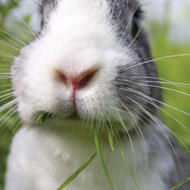
Disease is now geographically widespread in the UK
Veterinary organisations have issued advice to practices on a new strain of Rabbit Viral Haemorrhagic Disease.
As the spread of RVHD2 may be facilitated by its apparent progression, compared to RVHD1, the BVA, BSAVA and BVZA recommend practices talk to owners about preventing this potentially devastating disease.
In a joint statement, they write: 'Due to recent media coverage of RVHD2, vets may be contacted by concerned owners seeking advice on how to prevent their rabbits contracting this disease.
'Further to vaccinating, vets should recommend rabbits are kept separate from any other rabbits they do not usually interact with; are prevented from having contact with wild rabbits and do not attend any rabbit shows unless already vaccinated.'
RVHD2 is more variable in its rate of disease progression than RVHD1, with presentation ranging from sudden death (with or without bleeding from the orifices) to a longer disease course of three to nine days.
This longer disease course increases the risk of sick rabbits being brought into practices and, in turn, increases the risk of transmission to other pet rabbits.
Vaccines for the original strain of RVHD1 do not offer long term protection against RVHD2. However, vaccines for this new strain are now available in the UK. These can be purchased from Centaur, NVS and Henry Schein Animal Health.
John Chitty, BSAVA vice president, said: “BSAVA would encourage practices to talk to rabbit owning clients about RVHD2 vaccines, and where there is deemed sufficient risk recommend the vaccine along with the essential vaccination against Myxomatosis – and it should be noted that this must not be done within two weeks of vaccination against RVHD2.”
BVZS president Mark Stidworthy adds: “It is clear from post-mortem examinations and PCR testing over the last 18 months that RVHD2 is now geographically widespread in the UK and all rabbits should be considered at risk from this potentially devastating disease.”



 The veterinary mental health charity Vetlife is inviting the veterinary community to join it for a sponsored cold-water dip.
The veterinary mental health charity Vetlife is inviting the veterinary community to join it for a sponsored cold-water dip.